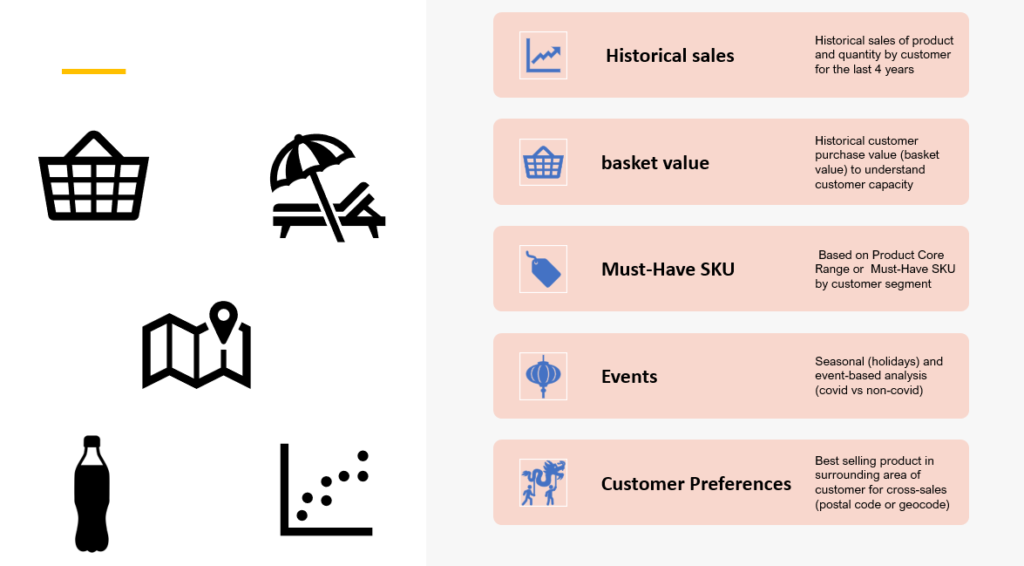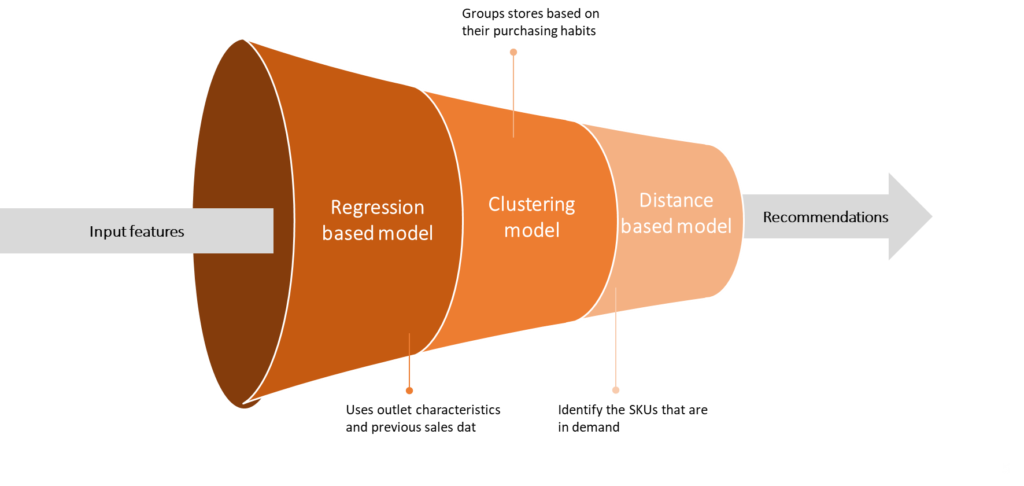Overview
Our customer, a 4-billion-dollar bottling company serving 600 million consumers and two million customers in 29 countries, relies on sales representatives for daily sales, order processing, and product promotions.
These sales reps play a critical role in the beverage industry, building strong customer relationships, ensuring product availability, and achieving sales targets. Leveraging customer stock data, historical orders, and basket values, sales reps make informed product recommendations, focusing on the essential “Product Core Range” or Must-Have SKU/MHS.
They also closely monitor customer spending patterns to identify opportunities for upselling and cross-selling during transactions.

Sales representatives play a crucial role in building personal relationships with customers and adding a human touch to sales and order-taking. However, there are some disadvantages associated with relying solely on sales reps. These include the high costs of hiring, training, and retaining sales reps, as well as the potential for personal biases to influence product recommendations.
The performance of sales reps may also vary based on individual skills and experience. Additionally, sales reps require training to be proficient in product knowledge and sales techniques. Mistakes in order processing can occur, leading to issues like incorrect shipments or delays. Sales reps may struggle to process large amounts of data quickly, especially in real-time situations. Emotional ups and downs may also impact their interactions with customers.
Given these drawbacks, our customer recognized the need to explore the potential of AI models as a solution to optimize their sales processes and elevate customer experiences. With the goal of overcoming the limitations associated with traditional sales representatives, our proposed approach involves building a sophisticated AI model tailored to the customer’s specific requirements.
How Ngenux’s approach to building AI based model results in significant sales uplift
As part of our digital transformation initiative, we proposed an ensemble model, that used distance-based, clustering-based, and regression-based approaches.
Features Used

The distance-based approach aims to identify the SKUs that are in demand and suggest them to outlets that are not currently advertising those products. This method uses data on sales transactions and customer behaviors to identify patterns and trends, allowing sales representatives to make informed decisions on the products to promote at each outlet.
The clustering-based approach groups stores based on their purchasing habits, allowing sales representatives to make comparable merchandise recommendations. This method helps optimize inventory management and reduce the time and effort required to analyze the data manually, enabling sales representatives to make data-driven decisions more quickly and effectively.
The regression-based models use outlet characteristics and previous sales data to forecast the SKUs’ sales volume. This method considers various factors, including outlet size, location, and customer demographics, enabling sales representatives to make more informed decisions on the products to promote at each outlet.

Once the top “n” SKUs are identified for each outlet using the regression-based model, the distance-based, and clustering-based models are used to select the top two new SKUs for the outlet. To combine the clustering and distance-based models, a weighted average is taken in a 3:1 ratio, giving more weight to the distance-based model.
The number of recommended SKUs for each outlet is determined by the outlet’s classification as Gold, Silver, or Bronze/Others.
The implementation of the new AI-based sales assistant has proved to be a game-changer for our customer’s sales representatives. The results from the two pilot areas have been remarkable, with significant sales uplifts of +108% and +15% respectively.
Notably, it has been observed that sales representatives who actively utilize this model achieve higher sales volume and revenue compared to their counterparts who use it less frequently.
The AI model has also been instrumental in empowering new sales representatives, with the majority of those with less than a year’s experience surpassing the average results.
The feedback from our sales reps further reaffirms the positive impact of the AI model on their daily operations. They emphasize that machine learning is the way forward, foreseeing a promising future for our customers’ sales growth.
The inclusion of the “Product Core Range” (MHS) in the AI model has been particularly beneficial for our sales reps. Previously, sales proposals were calculated manually, but now, with the AI model, the process has become significantly more streamlined.
Please get in touch with us at connect@ngenux.com to have an exciting discussion to discover how AI can elevate your business
